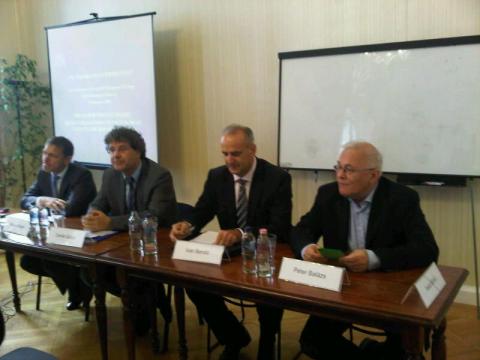Event Report - EU Enlargement Perspectives - An Introduction to the New EU Enlargement Package

The European Commission Representation in Hungary in co-operation with the Center for EU Enlargement Studies and the Center for Arts and Culture organised a panel discussion about the EU Enlargement prospectives on November 8, 2010. The discussion was followed by a photo exhibition opening entitled: 'Southeast Europe - People and Culture'.
Péter Balázs, Director of CENS, stated in his welcoming speech the importance of EU enlargement and neighborhood policies, stressing the importance of Croatia, Turkey and Iceland for the EU.
Tamás Szűcs, Head of the EC Representation in Hungary, pointed out to the fact that Croatia still has a number of important steps to take before becoming a member.
Vincent Degert, Head of Delegation of the European Union to Serbia, in the longest speech of the day, dragged attention to the success of enlargement, which he said brought peace, prosperity, stability, economic growth and employment to the continent in general but also to the recent members. As regards the claims that the EU is inventing new conditions to candidate states, he stated that the EU has not only enlarged in time but also deepened so it should be no surprise that each new candidate has to deal with more issues than the previous ones on the way to membership. He further argued that each candidate is evaluated on its own performance. He reiterated the commitment of the EU in helping the Western Balkan countries in dealing with issues of past burdens as well as the economic and financial commitments and the dismantling of the customs. Moreover, he suggested, visa liberalizations between the EU and Balkan countries are important for this not only facilitates life in practice but also brings a mental change in the people who will feel they are welcomed.
Mr. Degert presented the latest data on progress in each candidate/accession country in addition to potential candidates. He pointed to the difficult issues ahead of Croatia such as the ones relating to agriculture, environment, corruption, minorities and the budget. In Serbia’s case he stressed especially the importance of the future of Kosovo.
Mr. Degert summarized the challenges all countries facing as the political criteria, especially the implementation on ground, of legislative changes; good governance, relating to the functioning of institutions and separation of powers; rule of law, to be constituted especially with fair, transparent, and efficient justice systems; alignment in implementation and enforcement of the EU acquis; a predictable and stable investment environment; a functioning market economy, in which privatizations go through difficulties; independent regulatory bodies, to be filled with experts; minorities, and especially the need to provide them in their own language access to public services, employment and education; coming to terms with the past, and dealing with missing persons, returning of refugees; regional cooperation, in such fields as energy, transportation, or in closing the “impunity gap”.
Mr. Degert also drew attention to the risks involved on the way to enlargements, including the overall global economic crisis; unresolved bilateral issues between the countries in question; migration flows and the need for cooperation of involved states in preventing abuses; enlargement fatigue, which Mr. Degert does not seem to have any.
Ivan Bandic, Ambassador of the Republic of Croatia in Hungary, stated that the realistic period in which his country would conclude the negotiations to coincide with the Polish Presidency. He said he is optimistic about the referendum to be held in Croatia about the EU membership, quoting latest polls in September this year showing 52 % support with another 10 % undecided. The Ambassador suggested that Croatia strongly supports all countries in the region, and that Bosnia and Herzegovina constitute a key region to which the EU has to pay attention.
